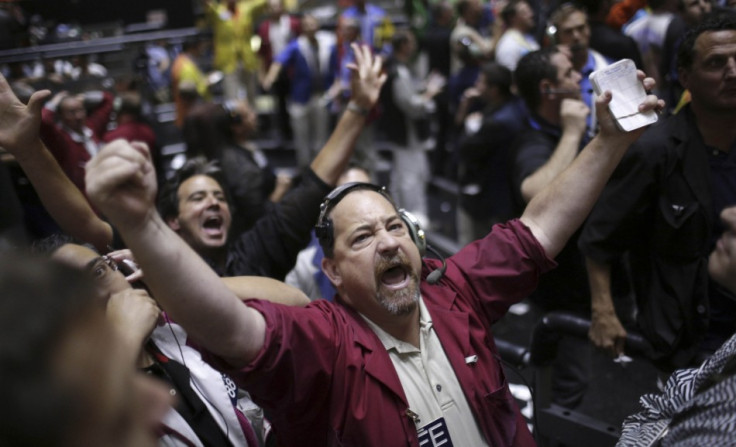World Economy: The Brink of Disaster [BLOG]

There's no doubt about it: the world is hovering on the brink of economic disaster and few, if any, of the world's leaders seem to want to acknowledge the situation. In fact, it's hard to believe just how grave the current situation is.
The chattering classes should be worried in the same way that they should have been worried during the three major crises of the 20th century: In 1914 when the French, German and Russian armies were mobilised and a catastrophic war became inevitable; in 1936 when Hitler's true intentions became apparent ; and in 1962 when the USSR sent nuclear missiles to Cuba. During the first two of these crises, world leaders failed to act and disaster ensued - the third of crisis was only resolved at the eleventh hour, narrowly averting nuclear war between America and the Soviet Union.
The current economic crisis was been building for over 50 years, based largely on unrestrained consumerism and the closely associated allegiance of Western governments to Keynesian economics. This has resulted, inevitably, in mountains of debt which can only be repaid, according to economists, through more "economic growth" - in other words, more of the same nonsense.
It appears that no other solution can be contemplated because any attempt to revert to common sense and sustainability would be instantly rejected by the electorate. Thus, the crisis will be allowed to grind on until it reaches the point of total economic collapse.
The US, which has maintained its global industrial and military dominance since the end of the Second World War, is currently facing its end of 2012 "fiscal cliff" crisis. Essentially, this has become a politically unresolveable conundrum which means that nothing can or will change.
Decisions will have to be taken, shortly after the presidential election, on the implementation of previously announced tax increases and spending cuts. If implemented, it is estimated that these policies will reduce GDP by 4% and plunge the US into recession, with a further 2 million or so unemployed, and could spell electoral disaster for the candidate who does not satisfactorily announce policy changes. With US federal debt currently at around $16tn, and growing at an annual rate of around $1.5tn, the ramifications are obvious.

In Europe the crisis continues to deepen with leaders now apparently committed to maintaining the current structure of the Eurozone. The accompanying meetings and announcements are a continuing farce in which the major players are apparently forced to provide meaningless reassurances, and commentators are obliged to ignore ludicrously obvious inconsistencies.
For example, Mario Draghi announces "unlimited" buying of government bonds while a decision by Germany's constitutional Court approves the structure but with strict limits on German exposure. So you have a situation where unlimited amounts of bonds are being purchased using limited resources!
Unless you can find some country other than Germany to fund the pantomime, it is now widely recognised that the Eurozone can only work within a federal structure. This means, essentially, a form of administration in which the citizens of recipient countries [those which receive more money from central funds than they put in] would be disenfranchised. If someone in a Western democratic country dared to suggest that voting rights should be restricted to net contributing taxpayers then there would be justifiable outrage. But that is exactly what the federalists are proposing. So where would countries such as Ireland stand in the new Eurozone?
Too small to be of any economic consequence, they would effectively be totally powerless, merely obeying the dictates of Brussels and Berlin. Is this what they expected when they decided to join the Eurozone? Let us be absolutely clear on the present situation. There is no way that economic stimulus and economic growth can resolve the debt problems of the western countries.
The only alternative to a total collapse of the system is a fundamental change of economic policy which will supported, over the necessary period of time, by the printing of money and the consequent devaluation of the currencies and assets of the West.
And what will this solution involve?
In order to consider any solutions to the current world economic crisis, it is necessary to define exactly what the problem is. Only then can the world consider abandoning the stupidity of unrestrained "economic growth" (increase in GDP) and take the first step in returning to sanity and sustainability.
The problem is essentially simple and obvious. The populations of the Western democracies have, for far too long, enjoyed lifestyles that they cannot afford, and have carried on with their extravagance on the back of the poorer, less developed countries. This has been encouraged by Keynesian economists who believe that the only solution to an economic problem is to spend your way out of it.
This means that people are discouraged from saving in the belief that the endless acquisition of unnecessary goods and services produces economic growth which, in turn increases employment and tax revenues. You would have thought that a five-year-old child should be capable of seeing the fallacy in this policy, but it has attractions for large sections of the population.
They apparently enjoy drinking themselves to death, eating until obese and spending their lives watching braindead television, gambling or amusing themselves with electronic gadgets while dismissing any form of discipline, imposed or self.
Appeasement of this attitude has lead to catastrophic falls in educational and behavioural standards and a subsequent loss of competitiveness in world markets. Who, in the western world, will have the courage to begin the reversal of this stupidity?
Christopher Clarke is a former Goldman Sachs executive director, a hedge fund manager at Lawrence Clarke Investment Management and a senior lecturer in accounting and finance at Nottingham Business School. He has also launched a new blog to comment on the state of the global economy at www.economicperil.com
© Copyright IBTimes 2025. All rights reserved.



















